Hide.me VPN
EVenture Limited subsidiary Hide.me is a Malaysia-based company which has been making waves in the VPN business since 2011.
Hide.me's network is a fair size, with 1,900 servers (up from 1,800 last time) spread across 75 locations. That's not bad at all, but the likes of ExpressVPN (3,000+ servers across 94 countries) and CyberGhost (6,400 in 90) give you even more options.
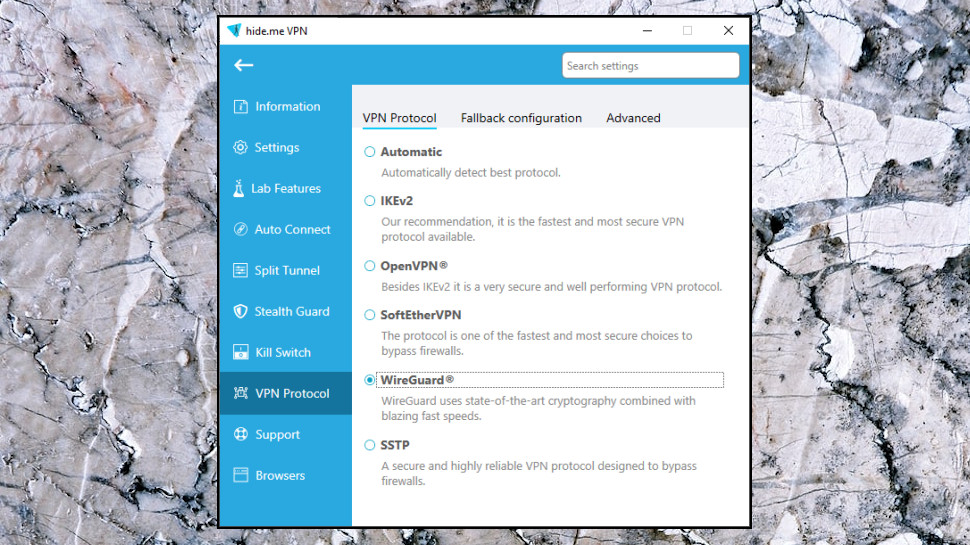
The company piles on the features, though. Wide protocol support includes WireGuard, OpenVPN, IKEv2, SoftEther and SSTP; there's protection against DNS, IP and even IPv6 leaks; port forwarding is available if you need it; the service can be used on Windows, macOS, Android, iOS, Linux, Routers, Consoles and Smart TVs, you can connect up to ten devices simultaneously, and there's 24/7 live chat support if you run into problems.
Hide.me claims to support P2P on most servers. We verified this by connecting to five different locations, and had hassle-free torrenting in each case.
The Hide.me apps point you to specialist servers for unblocking Netflix, BBC iPlayer, Netflix, Hulu, Amazon Prime, HBO Now and more (RAI, DAZN, Blu TV.)
- Want to try Hide.me? Check out the website here
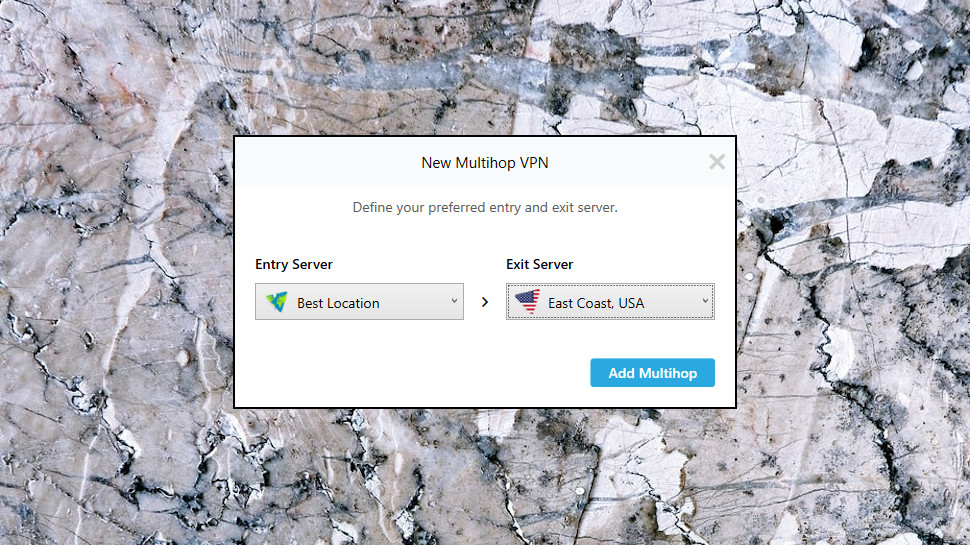
New features since the last review include MultiHop VPN, where you connect to one location and exit from another. The extra hop may slow you down a little, but it can help bypass VPN blocking and makes it more difficult for anyone to track who you are. Some VPNs have similar features - NordVPN's Double VPN, say - but they often restrict the servers you can use. MultiHop VPN enables choosing any entry or exit server from its full location list.
A VPN Bolt feature for Windows claims to accelerate speeds by routing all traffic through TCP rather than UDP. Doesn't sound like the best idea as TCP is normally slower, but Hide.me applies other tricks, too - hardware offloading, multiplexing through TLS 1.3 channels, encryption via AES-GCM (x64) or ChaCha-Poly-1305 (ARM) - so there may be some value here. And it's entirely optional, so if the technology doesn't work for you, just turn it off.
Smaller mobile improvements include the ability to set custom DNS servers on iOS, while Android users get dark mode, Android TV support and a landscape mode for tablets.
Beware, though-- the company has also removed support for Android versions prior to 6 (Marshmallow.) Not unreasonable as it's several years old, but you may not think that if you've got old hardware, and ExpressVPN, IPVanish, Private Internet Access and others still support Android 5.
Plans and pricing
Hide.me's Premium plan is a little expensive, at least for short-term use, at $12.95 billed monthly. That's around the same as ExpressVPN and CyberGhost, but Private Internet Access, Hotspot Shield, Ivacy and many others charge around $10.
A six month plan looked better value at $6.65 a month, until we realized the annual plan is just $3 a month for the first 15 months (that's three free months), then $3.75 on renewal. Or if we look at totals, sign up today and you could pay $39.95 to get six months service, but that doesn't make much sense when you can get 15 months of coverage for only $45.
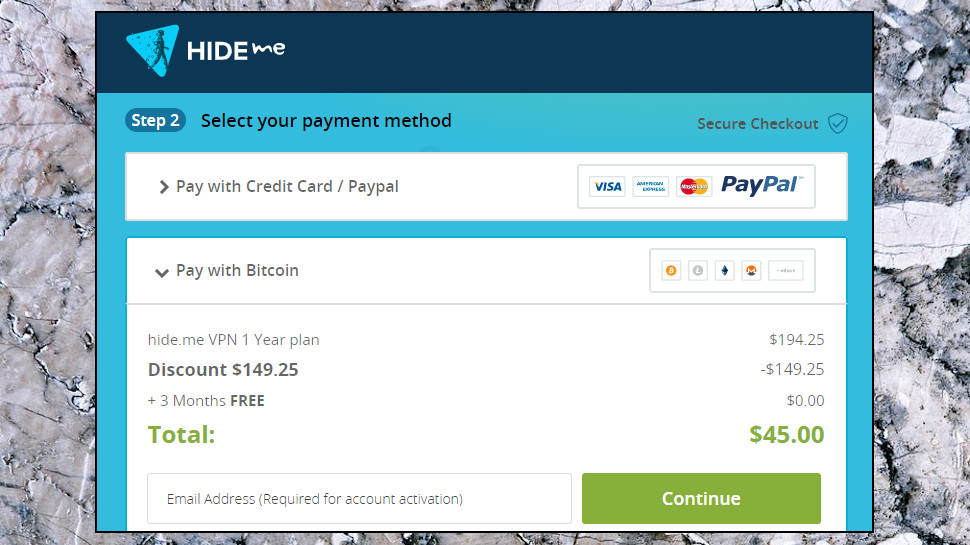
Whatever your preference, a wide range of payment options includes cards, Bitcoin, PayPal and many other providers.
Hide.me's old refund 'catch' (you might not get your money back if you'd "consumed a significant amount of your transfer data") has been ditched, fortunately, in favor of a simple 30-day money-back guarantee. If you're unhappy, just send the company an email within the 30 days to get a refund.
This is just about as good a deal as you'll get for a one-year plan, but some providers cut their prices even further if you extend your term. Private Internet Access charges an effective $2.69 a month for the first term of its two-year plan ($2.91 on renewal), while Ivacy's five-year plan is priced at just $1.33 a month.
You'd rather pay nothing at all? Surprisingly, Hide.me might be able to help. Its free plan offers a reasonable 10GB data a month, but you only get access to five locations (USA, Canada, Netherlands, and two in Singapore), there's support for connecting just one device at a time, and it doesn't automatically renew at the end of each month (you can do it yourself online, so this is just a minor admin hassle.) It does support P2P, though, surprisingly-- good news, even with the data limit.
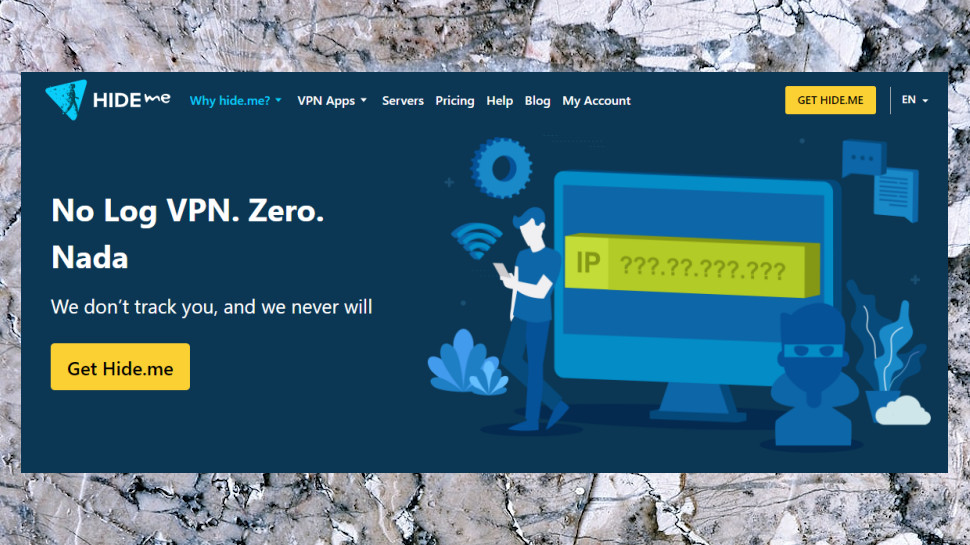
Privacy
Hide.me has a strict "no logging, ever" policy, the company claims, saying: "Logs can easily link actions back to you, and some VPN providers pass these onto law officials when told to do so. We can't, as we don't have any. Simple."
The Privacy Policy goes on to rule out both activity and session logging, explaining that: "We do NOT keep logs of your VPN sessions, browsing behavior, websites you visit, or any activity related to your VPN connection. In addition, we NEVER store VPN connection logs and timestamps that match your incoming and outgoing IP address or session duration."
Hide.me does keep a running total of data transfer usage, but that's no surprise for a service where some plans have bandwidth limits. It also keeps your email address, but that's to be expected, too.
There's no sharing of data with third parties. The company does use Google Analytics on its website, but even there points out that "to enhance your anonymity, Hide.me have opted to only allow Google to collect only a portion of the IP address".
Hide.me says it will comply with court orders received by recognized legal authorities with jurisdiction over them. But again, that's to be expected, and if the logs don't show anything significant, that won't matter at all.
This all looks and sounds great, but there is still room for improvement. Big VPN names including TunnelBear, NordVPN and VyprVPN have now verified their privacy credentials with public audits. It's an effective way to reassure potential customers that a VPN is living up to its promises, and we hope that other providers will follow.
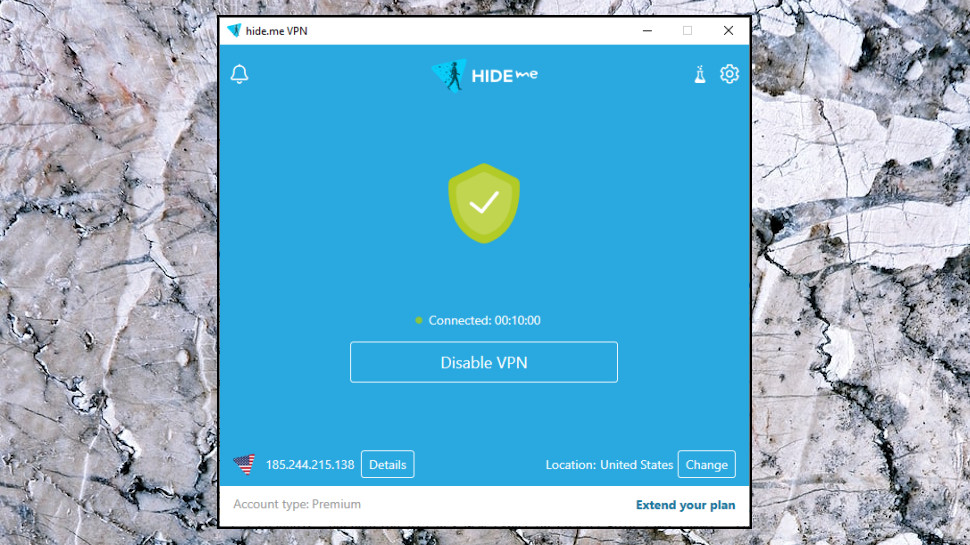
Apps
Hide.me's Windows app is simple and straightforward. The opening screen has little more than a large Connect button which plugs you into the nearest server, but the full location list (countries, expandable to cities in some cases) is just a click away, and status information about your current IP address and location is always visible.
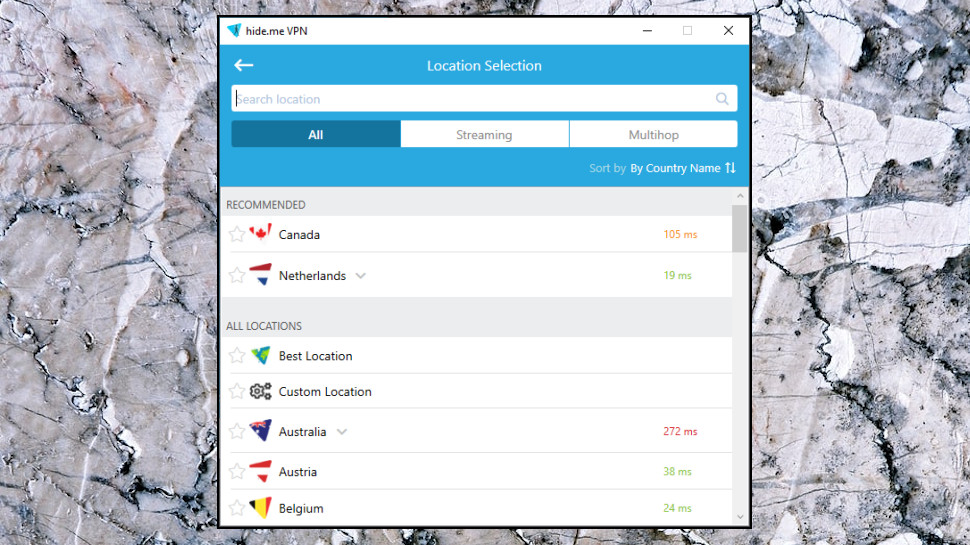
The server list now includes ping times for each location to help you judge speeds, an addition since our last review. A Search box makes it easy to find locations by name, though, and a Favorites system enables grouping your most commonly used servers together for speedier access later.
Connection times were sometimes a little longer than usual, but only by a couple of seconds, and this is unlikely to be an issue in real world use. The app raises notifications when it connects and disconnects, so you're always sure when you're connected.
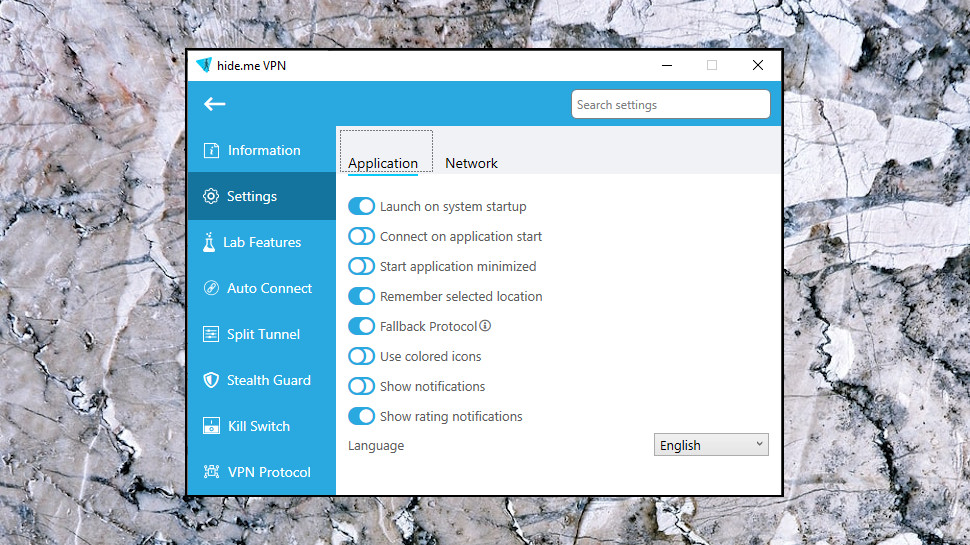
The Settings dialog begins with all the main options you'd expect. It can launch when your system starts; optionally connect to the best location, or the last one you used; protect your traffic with a kill switch if the VPN drops, and reconnect automatically to get you back online at speed.
There's real depth here. The app supports no less than five protocols (WireGuard, OpenVPN, IKEv2, SoftEther, SSTP), for instance, with a stack of configuration options: IKEv2 stealth mode, custom and random ports, tunnel via IPv4 or IPv6, and more.
The advanced features continue, everywhere you look. For example, split tunneling support enables defining which apps should use the VPN, and which will use your regular connection. And the client doesn't just have a single on/off Kill switch setting to define what happens if the connection drops. It can also run custom scripts when the connection drops, and gives so much control that you can even define if they're run as the current user, or an administrator.
Even Hide.me's system tray icon is super-charged. Right-click most VPN tray icons and you'll get 'show' and 'exit' options; here, you can connect to the default server, select any of the others, browse your favorites, close the current connection, and open the settings box, too.
Hide.me's new MultiHop feature proved very easy to use. Choose an entry server of New York, say, that's where you'll connect, and you'll be redirected through Hide.me's network to your pick of exit servers: let's say London. Websites will think you're in the UK, and even if an attacker manages to compromise the London server, they won't be able to link the activity to your account (you've accessed it using the New York server, not your own IP.) Whether this is really necessary is open to question, and the extra hop will slow you down a little, but we're happy that users now have the option.
Hide.me's Bolt speedup technology made no clear difference to performance in our tests. Speeds were so fast that really wasn't an issue, though (more on that in a moment.) Bolt is still in beta, and it's possible that you'll see very different results depending on your network and device setup, so we're reserving judgement for now. As we suggested above, just try it and see. If Bolt works for you, great; if it doesn't, disable it until Hide.me issues an update.
The mobile apps can't compare with all this desktop power, but they still outperform most of the competition. For example, the Android app supports WireGuard, OpenVPN and IKEv2; can automatically connected when you access specific network types; supports custom DNS settings, split tunneling, and more.
Better still, the free plan means it's easy to check out any or all of this. You don't have to register to use Hide.me, or hand over any personal details - just install it from your app store, explore the various screens and see how it works.
And if you don't understand something, or there's some other problem? You can even raise a ticket from within the app. Now that's what we call convenient.
Kill switch
We checked out the Windows app's kill switch by manually closing an IKEv2 connection and everything worked as it should, our internet access blocked right away, a notification warned us about the problem, and the app reconnected within seconds.
Our connection remained protected when we switched servers, too, a weak point with some apps. (Switch locations and some apps just close the first connection, then try to connect to the new server, leaving your traffic exposed in the meantime.)
The system didn't perform as well when we switched to OpenVPN, though. It still blocked internet access when the connection dropped, but didn't cover us when we changed locations.
The problems really began when we tried our most extreme tests, forcibly closing the OpenVPN.exe and WireGuard.exe processes and checking what happened. You're unlikely to see either process crash in real life, but our goal is to see how robust an app really is, how well it handles unexpected events.
In both cases, Hide.me's kill switch correctly blocked our internet access, preventing unprotected traffic leaving our system: great.
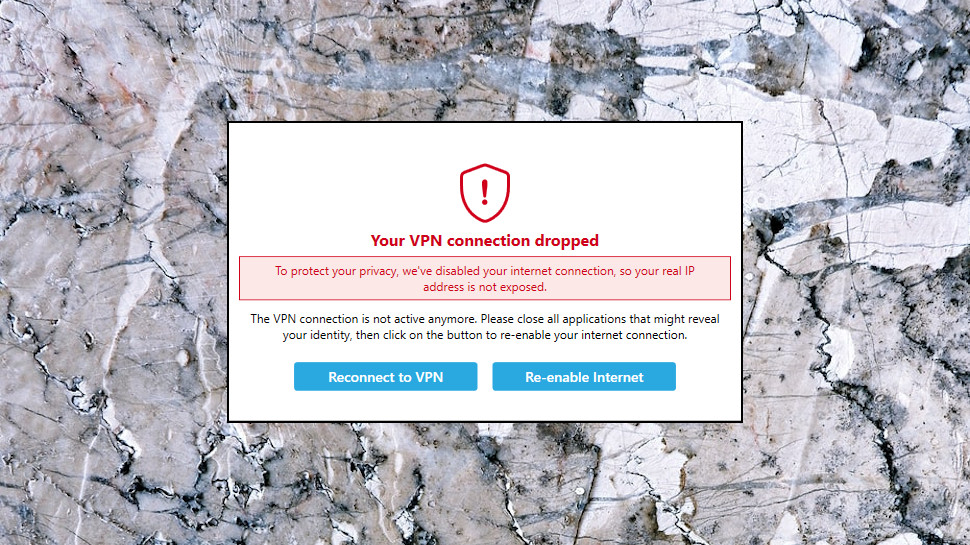
Unfortunately, it then refused to reconnect, even after we left it running for more than ten minutes. So, we gave up, hit Cancel, and then watched a 'Disconnecting, please wait...' message for another ten minutes.
Annoying, especially as we couldn't do anything else because our internet connection was still disabled by the kill switch. Eventually we turned off the kill switch from Settings, closed the Hide.me app manually from Task Manager, restarted the system, and our internet was back.
We don't know what exactly what the problem was, but it suggests the app had lost track of our connection state, which is a little worrying. Even if we're wrong about that, there's a very basic usability issue here: if an app can't carry out some action for a long period, then it should time out, not force the user to close it down manually.
But on the other hand, these were the most extreme of our tests, and even here, the kill switch worked. Our connection was protected. And in the more common situations, where the connection just dropped, the app worked very well.
There's work to be done, then, but don't necessarily rule Hide.me out because of our hassles. If you'll use its expert-level features and functionality, there's still a lot to like here.
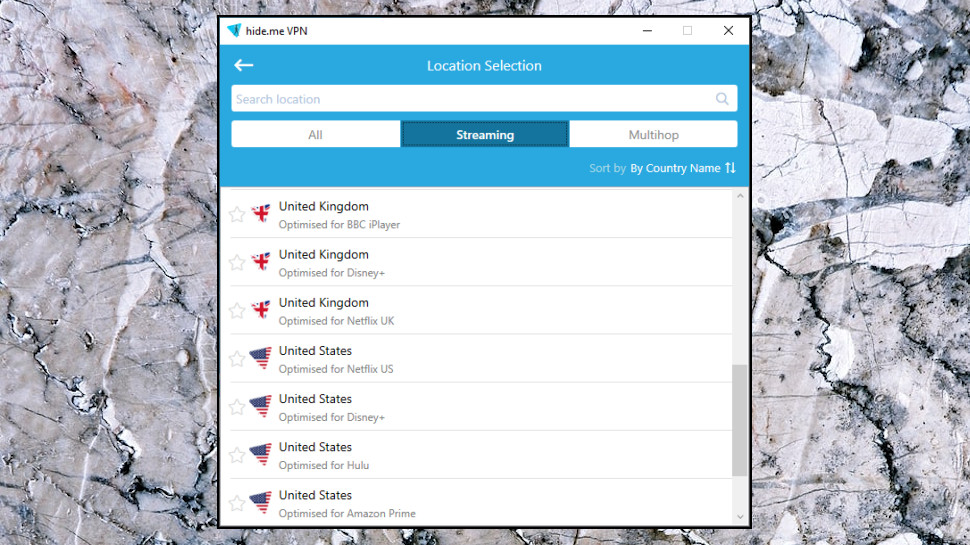
Netflix
Most VPNs claim they can help you access geoblocked website, and Hide.me is no exception, with the website promising that you'll 'avoid annoying censorship.'
We connected to Hide.me's UK iPlayer streaming server, and the company turned out to be right - it unblocked the service immediately. We repeated the same test twice more, and were successful each time.
It was the same perfect three out of three for US Netflix, with Hide.me getting us access with every test.
We had no luck with Amazon Prime, but the good news returned with Disney+, where Hide.me scored another three successes out of three.
We noticed a possible performance issue, where sites could take an unusually long time (up to a minute) to display a page or begin streaming. This wasn't consistent, though, and we couldn't identify a cause. Even if it was VPN-related, once the sites began streaming we had no quality or buffering problems.
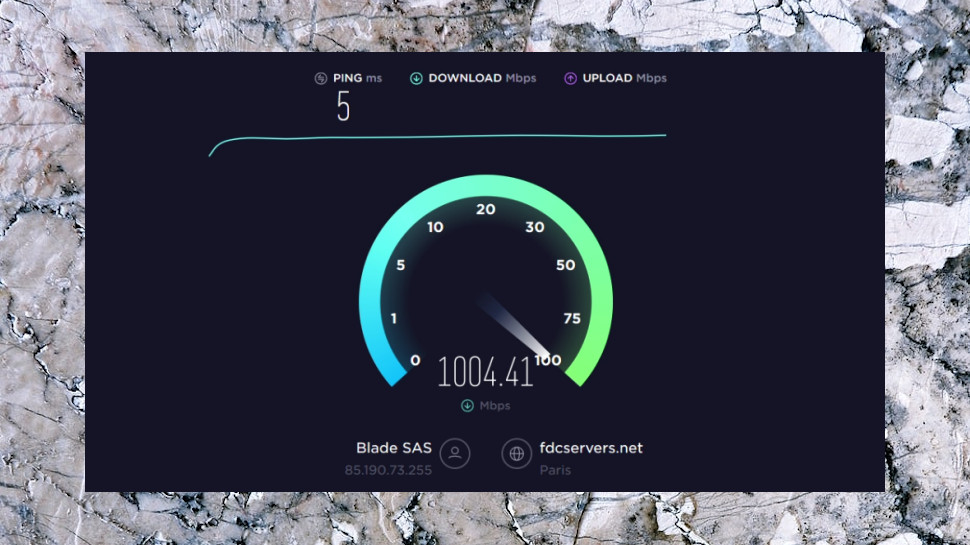
Performance
We assess VPN speeds by running multiple automated speed tests using several platforms (SpeedTest, TestMy, Fast.com and more), from both a UK data center and a US home location with a 1Gbps+ cable connection.
We couldn't get OpenVPN working properly in our test environment, but we don't know the cause, so we're not counting that against Hide.me. WireGuard performance was excellent, though, with median download speeds reaching 550Mbps in one session, 760Mbps in another. Interestingly, upload performance was even better, with our fastest recorded upload hitting 834Mbps.
These are great figures and show Hide.me has a lot of performance potential. Keep in mind that we were testing from a data center, though, with excellent connectivity, so our results will be at the top end of what's achievable.
US OpenVPN speeds were more ordinary, though still acceptable at 140-220Mbps, while IKEv2 connections reached a broadly similar 150-160Mbps. Switching to WireGuard saw a major jump in speeds, however, up to 390-420Mbps. That's in the same area as our latest US WireGuard results from CyberGhost (350-450Mbps), VPN Unlimited (380-390Mbps) and TorGuard (410-480Mbps), although ExpressVPN's Lightway protocol outperformed them all at 490-630Mbps.
Hide.me scored very well in our final privacy tests, too, with ipleak.net, dnsleak.com and dnsleaktest.com confirming that it correctly shielded our IP, allocated us a new address from our chosen country, blocked DNS leaks, and properly cloaked our online activities at all times.
Final verdict
Hide.me is a speedy and highly configurable service, with an array of unusual expert-level features. If you're looking for power then go check out the free version right now, see what it can do for you.
- Also check out the best VPN
0 comments:
Post a Comment